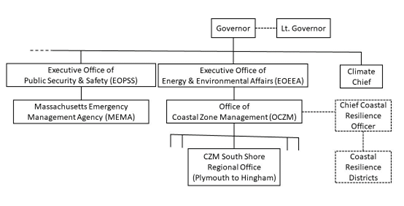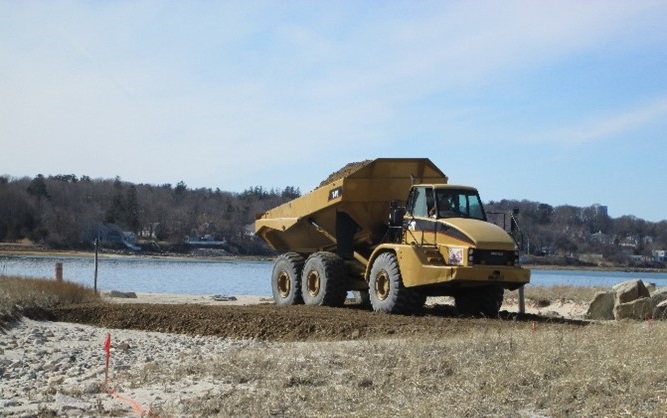On Tuesday, the state announced an initiative to focus on responding to the coastal effects of climate change, especially flooding and coastal erosion. Massachusetts has 1,500 miles of coastline, spanning 78 cities and towns. A fair section of that is part of Plymouth. The state has predicted that, on average, damages to coastal structures may amount to as much as $1 billion annually by 2070.
Top state officials were on hand for the announcement in Beverly, a nod to its importance. They included Governor Maura Healey, Lieutenant Governor Kim Driscoll, Secretary of Energy and Environmental Affairs Rebecca Tepper, and Coastal Zone Management Director Lisa Engler.

Called “ResilientCoasts,” the initiative will be led by a chief coastal resilience officer to be appointed in the state’s Office of Coastal Zone Management (OCZM), and will involve a coordinated regional approach to these problems.
The announcement took place during a “king tide” at low-lying David S. Lynch Memorial Park on Salem Harbor in downtown Beverly. Also known as perihelic-perigean tides, they comprise the highest of high and the lowest of low tides during the year. King tides occur when, during their respective orbits, the Earth is closest to the sun and the moon is closest to the Earth.
King tides are the kind of event where we can expect to begin to see coastal flooding and erosion as sea levels continue to rise. Rising sea levels are, of course, the result of the expansion of a warming ocean and — in the future — the Earth’s melting ice sheets. Coastal flooding can also occur due to surges from tropical cyclones and the natural damming of rivers that drain areas experiencing heavy rain. A good example of the latter often occurs at the mouth of Plymouth’s Eel River during winter northeasters.
ResilientCoasts has emerged from some of the most urgent priorities identified in the 2023 ResilientMass Plan. Specifically, these priorities include impacts from coastal wetland degradation, expected reductions in state and municipal revenues, increases in response costs, and the damage to or loss of coastal roads and property.

For many years, OCZM has been involved in helping coastal municipalities plan for and respond to shoreline changes. Since 2014, the state has granted $46 million to coastal municipalities through its Coastal Resilience Grant Program. Plymouth has received nearly $2.7 million, including most importantly funds for replenishing sand on Long Beach. Plymouth’s 2015 beach nourishment project is listed as one of OCZM’s featured coastal resilience projects.
The ResilientCoasts initiative will involve the establishment of “Coastal Resilience Districts” along the Massachusetts coast that share landscape characteristics and climate hazards. It is expected that such districts could comprise multiple municipalities, but alignment with OCZM’s existing regional offices, the state’s regional planning councils, or municipal jurisdictions will need to be determined. Towns such as Plymouth, with an extensive and geologically diverse coastline, might not fit neatly into one contiguous district.
The initiative is also expected to coordinate with state agencies and local communities to identify building standards and scientific best practices. Another priority is to assess the potential for adopting nature-based solutions, including the restoration or maintenance of wetlands and beach nourishment.
Of particular note, the initiative will assess strategies, including the possibility of “managed retreats” from a dynamic shoreline in some areas. Managed retreat could involve moving buildings, including homes and businesses, and infrastructure, including roads and utilities, shoreward as sea levels rise. The Massachusetts Emergency Management Agency will be tasked with evaluating the establishment of a state buyout program that could facilitate managed retreat.
The initiative bears close watching as its components take shape. Undoubtedly, there will be plenty of opportunities to contribute to the design and implementation of coastal resilience strategies in Plymouth and along the entire state shoreline. A good contact is Jason Burtner, the CZM South Shore regional coordinator, who is based in Scituate. He can be reached at jason.burtner@mass.gov.
Porter Hoagland writes on environmental and natural resource matters that affect Plymouth. Hoagland, a Plymouth resident, can be reached at phoagland@whoi.edu.

